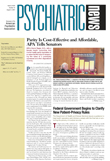It seems that for many Americans, the road to recovery from major depression and clinical anxiety is more like a steeplechase course. Significant barriers to the diagnosis and treatment of mental disorders still exist, and many people are living with debilitating symptoms.
These conclusions came from the National Mental Health Association’s (NMHA) second America’s Mental Health Survey, which was conducted by Roper Starch, Worldwide Inc. The firm called more than 3,000 randomly selected adults in the U.S. in April. Surveyors gave respondents a symptom checklist derived from the Diagnostic and Statistical Manual of Mental Disorders, Fourth Edition, Revised, to determine whether they were likely to meet criteria for major depressive disorder or generalized anxiety disorder (GAD).
The results revealed that 93 percent of those presumed to have major depressive disorder or GAD did not associate their symptoms with a mental disorder. Yet almost half of them said their symptoms caused them a great deal of emotional pain and prohibited them from leading normal lives.
Thirty-two percent of the respondents reported symptoms consistent with a diagnosis of either clinical depression or GAD, and only 18 percent of those with significant symptoms said they had ever received a diagnosis of any mental disorder. Those more likely to be undiagnosed were male, under 34 years old, and less educated.
For people who had symptoms of clinical depression or anxiety and were not diagnosed, researchers tried to determine why they had not sought the help of a professional. Forty-four percent said that they could handle the symptoms on their own,28 percent said they either had limited or no insurance coverage, and 18 percent said they were too busy to go to a doctor.
Other reasons for not seeking help were being afraid of having to take medication and not knowing of a doctor to go to.
The survey results also showed that stigma is a significant issue for people who have been diagnosed with either major depression or GAD: 42 percent of this group said they are embarrassed or ashamed by their symptoms, as compared with 17 percent of those without a diagnosis.
“We need to remove the stigma from psychiatric disorders,” said Norman Sussman, M.D., a clinical professor of psychiatry at New York University School of Medicine who was chosen by the NMHA to comment on the survey results. Sussman said that although both groups—diagnosed and nondiagnosed—have the same symptoms, stigma is more of an issue for people who have been identified as having a psychiatric disorder.
Additionally, 44 percent of people who reported symptoms consistent with either major depression or GAD tried on their own to relieve their symptoms, such as depressed mood, insomnia, or fatigue. Some people relied on prayer (41 percent), rest (38 percent), or exercise (37 percent). Thirty-one percent sought out a friend or family member for emotional support.
“We know these things can be helpful when added to a treatment regimen that includes medications,” said Sussman, “but people have the mistaken notion that by restructuring their lives, they can work through these disorders.”
Almost half of Americans with symptoms said they did not have great faith in standard psychiatric treatments such as medication and psychotherapy: only 47 percent believed that with these treatments, they would recover.
This finding may be related to another finding—about a third of the respondents diagnosed with depression or anxiety were highly satisfied with the treatment they were receiving at the time of the interview. For instance, 27 percent gave their treatment for clinical depression a top rating, and 30 percent of those being treated for GAD were highly satisfied with the results of the treatment.
Sussman believes that more education will help dispel some common myths about what mental illnesses are. “The public has not been well educated about the fact that most psychiatric disorders are medical or physical disorders and cause high rates of disability,” he said.
Publicizing the findings of America’s Mental Health Survey is a major part of this education process, according to Michael Faenza, president and CEO of NMHA. “It is vital that mental health advocates, educators, and clinicians understand what the public knows and doesn’t know about mental illnesses and treatments,” he said. “That way, misinformation and misconceptions can be addressed through targeted public education campaigns that deliver clear and consistent messages.”
Another NMHA survey, however, revealed that America is better informed about depression than America’s Mental Health Survey would indicate.
The sample for the survey, conducted via telephone in January, included 500 adults being treated for depression; 300 psychiatrists, primary care physicians, and psychologists; and 800 adults without depression.
Fifty-five percent of the general respondents who had never been diagnosed with depression said that they understand it to be a disease. However, 1 in 3 people sampled said they believed that depression was a “state of mind that you can snap out of.” This view, according to Faenza, can cause widespread damage.
“People’s understanding of and attitudes about mental illness have a direct impact on public health,” he said. “If people think mental health problems are ‘all in their heads,’ they are more likely to suffer in silence, and have impaired relationships and functioning at work. The costs of their illnesses are more likely to be borne by the primary health care system, by employers, and by the public sector.”
Other findings from the survey revealed that 76 percent of people with depression believe that they would probably need some kind of treatment throughout the remainder of their lives.
Additionally, 40 percent of all health care providers surveyed said that their patients had difficulty adhering to their medication regimens, and 52 percent said the same for their patients’ psychotherapy regimens. ▪
